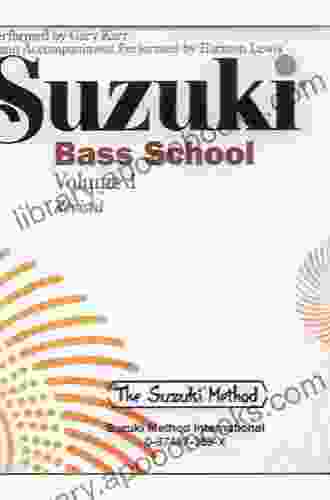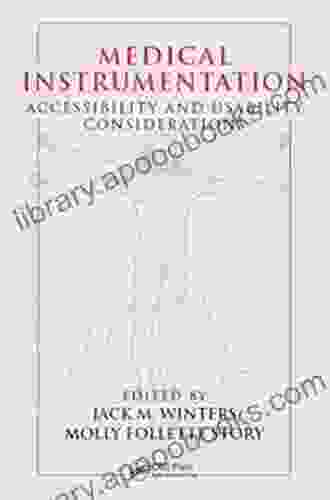Unlocking Healthcare Equity: Essential Considerations for Medical Instrumentation Accessibility and Usability

In today's rapidly evolving healthcare landscape, inclusivity and accessibility are paramount for ensuring equitable access to medical care. Medical instrumentation plays a crucial role in diagnosis, treatment, and patient monitoring, but its accessibility and usability often present barriers for individuals with disabilities. This comprehensive article delves into the critical factors that healthcare providers, designers, and policymakers must consider to improve medical instrumentation accessibility and usability for all.
Understanding the Challenges
Individuals with disabilities face a myriad of challenges when interacting with medical instrumentation. These include:
4.3 out of 5
| Language | : | English |
| File size | : | 9716 KB |
| Text-to-Speech | : | Enabled |
| Screen Reader | : | Supported |
| Enhanced typesetting | : | Enabled |
| Print length | : | 465 pages |
- Physical barriers: Equipment that is not adjustable or lacks ergonomic features may be inaccessible for individuals with mobility impairments.
- Sensory barriers: Instrumentation with insufficient auditory or visual cues can hinder use for individuals with hearing or vision impairments.
- Cognitive barriers: Devices with complex interfaces or instructions may be difficult to understand for individuals with cognitive disabilities.
- Social barriers: Negative attitudes or assumptions about the capabilities of individuals with disabilities can lead to barriers in accessing and using instrumentation.
Design Principles for Accessibility
To overcome these challenges, medical instrumentation must be designed with accessibility in mind. Key design principles include:
- Universal design: Designing equipment that can be used by individuals with diverse abilities without the need for adaptation.
- Flexibility and adjustability: Incorporating adjustable features, such as height-adjustable chairs or adaptable software interfaces, to accommodate different user needs.
- Redundant sensory feedback: Providing multiple modes of feedback, such as audio, visual, and haptic cues, to enhance accessibility for individuals with sensory impairments.
- Intuitive interfaces: Simplifying user interfaces, using clear language, and providing accessible documentation to reduce cognitive barriers.
- Inclusive representation: Involving individuals with disabilities in the design process to ensure their perspectives are incorporated.
Incorporating Usability Considerations
Beyond accessibility, usability is essential for ensuring that medical instrumentation is effectively used by healthcare providers and patients alike. Usability considerations include:
- Task analysis: Understanding the specific tasks that users need to perform with the instrumentation and designing it accordingly.
- User testing: Conducting usability tests with representative users to identify and resolve usability issues.
- Training and support: Providing comprehensive training and support materials to empower users to use the instrumentation effectively.
- Continuous improvement: Regularly evaluating and improving the usability of instrumentation based on user feedback and technological advancements.
Policy and Regulatory Implications
To ensure widespread adoption of accessible and usable medical instrumentation:
- Policymakers: Enacting legislation and regulations that mandate accessibility and usability standards for medical devices.
- Manufacturers: Incentivizing manufacturers to invest in research and development of accessible and usable instrumentation.
- Healthcare providers: Selecting and implementing instrumentation that meets the needs of diverse patient populations.
- Advocacy organizations: Raising awareness about accessibility and usability issues and advocating for inclusive healthcare practices.
Improving medical instrumentation accessibility and usability is a moral and ethical imperative that benefits not only individuals with disabilities but also healthcare providers and the healthcare system as a whole. By embracing universal design principles, incorporating usability considerations, and implementing supportive policies, we can create a more equitable and inclusive healthcare environment where everyone has access to the care they need.
Unlocking the full potential of medical instrumentation requires a concerted effort from all stakeholders. By working together, we can transform healthcare into a truly inclusive field where individuals with disabilities can thrive.
Embrace Accessibility and Usability: Join the movement towards equitable healthcare for all.
4.3 out of 5
| Language | : | English |
| File size | : | 9716 KB |
| Text-to-Speech | : | Enabled |
| Screen Reader | : | Supported |
| Enhanced typesetting | : | Enabled |
| Print length | : | 465 pages |
Do you want to contribute by writing guest posts on this blog?
Please contact us and send us a resume of previous articles that you have written.
 Book
Book Novel
Novel Page
Page Chapter
Chapter Text
Text Story
Story Genre
Genre Reader
Reader Library
Library Paperback
Paperback E-book
E-book Magazine
Magazine Newspaper
Newspaper Paragraph
Paragraph Sentence
Sentence Bookmark
Bookmark Shelf
Shelf Glossary
Glossary Bibliography
Bibliography Foreword
Foreword Preface
Preface Synopsis
Synopsis Annotation
Annotation Footnote
Footnote Manuscript
Manuscript Scroll
Scroll Codex
Codex Tome
Tome Bestseller
Bestseller Classics
Classics Library card
Library card Narrative
Narrative Biography
Biography Autobiography
Autobiography Memoir
Memoir Reference
Reference Encyclopedia
Encyclopedia Robert Covert
Robert Covert Josh Turknett
Josh Turknett Lisa Harris
Lisa Harris John Ericson
John Ericson Oscar Micheaux
Oscar Micheaux Maddy Court
Maddy Court Rick Mckeon
Rick Mckeon John O Connor
John O Connor Jon Saphier
Jon Saphier Tanya R Taylor
Tanya R Taylor P L Thomas
P L Thomas Timothy P Carney
Timothy P Carney Karen M Burns
Karen M Burns Jon Giganti
Jon Giganti Margarita Montimore
Margarita Montimore Richard Erlanger
Richard Erlanger John M Zito
John M Zito S J Flynn
S J Flynn Tom Knisely
Tom Knisely Krista Shaffer
Krista Shaffer
Light bulbAdvertise smarter! Our strategic ad space ensures maximum exposure. Reserve your spot today!

 Everett BellDaily Exercises for Beginners and Advanced Players: Essential Exercises to...
Everett BellDaily Exercises for Beginners and Advanced Players: Essential Exercises to...
 Peter CarterUnveiling the Mysteries of Maine's Forests: A Captivating Journey with "What...
Peter CarterUnveiling the Mysteries of Maine's Forests: A Captivating Journey with "What...
 DeShawn PowellDiscover the Enchanting Mississippi Gulf Coast: A Fishing and Visitor's Guide
DeShawn PowellDiscover the Enchanting Mississippi Gulf Coast: A Fishing and Visitor's Guide
 Abe MitchellMaster the Bass with Suzuki Bass School Volume 1 Revised: An In-Depth Review...
Abe MitchellMaster the Bass with Suzuki Bass School Volume 1 Revised: An In-Depth Review... José MartíFollow ·6.8k
José MartíFollow ·6.8k Frank ButlerFollow ·16.7k
Frank ButlerFollow ·16.7k Danny SimmonsFollow ·18.5k
Danny SimmonsFollow ·18.5k Aron CoxFollow ·17.5k
Aron CoxFollow ·17.5k Jorge Luis BorgesFollow ·3.3k
Jorge Luis BorgesFollow ·3.3k Levi PowellFollow ·13.7k
Levi PowellFollow ·13.7k Clark BellFollow ·12.1k
Clark BellFollow ·12.1k Kirk HayesFollow ·7.3k
Kirk HayesFollow ·7.3k

 Tyler Nelson
Tyler NelsonHer Dragon to Slay: Embark on an Epic Journey of...
In a realm where shadows dance and legends...

 Zachary Cox
Zachary Cox101 Best Marine Invertebrates: The Adventurous Aquarist's...
Unveiling the Enchanting Realm...

 William Wordsworth
William WordsworthHer Dragon Fire: Unleash the Power Within Your Soul
Embark on an...

 William Powell
William PowellUnveiling the Enchanting World of Machine Embroidery with...
Embroidery, an ancient art form that has...

 Will Ward
Will WardGolden Fire Clan Dragon Guard: A Journey into a Realm of...
Prepare to be...

 Gustavo Cox
Gustavo CoxProject Ideas to Elevate Your Hobbies and Flourish Your...
<p>Welcome to the ultimate guide to...
4.3 out of 5
| Language | : | English |
| File size | : | 9716 KB |
| Text-to-Speech | : | Enabled |
| Screen Reader | : | Supported |
| Enhanced typesetting | : | Enabled |
| Print length | : | 465 pages |




